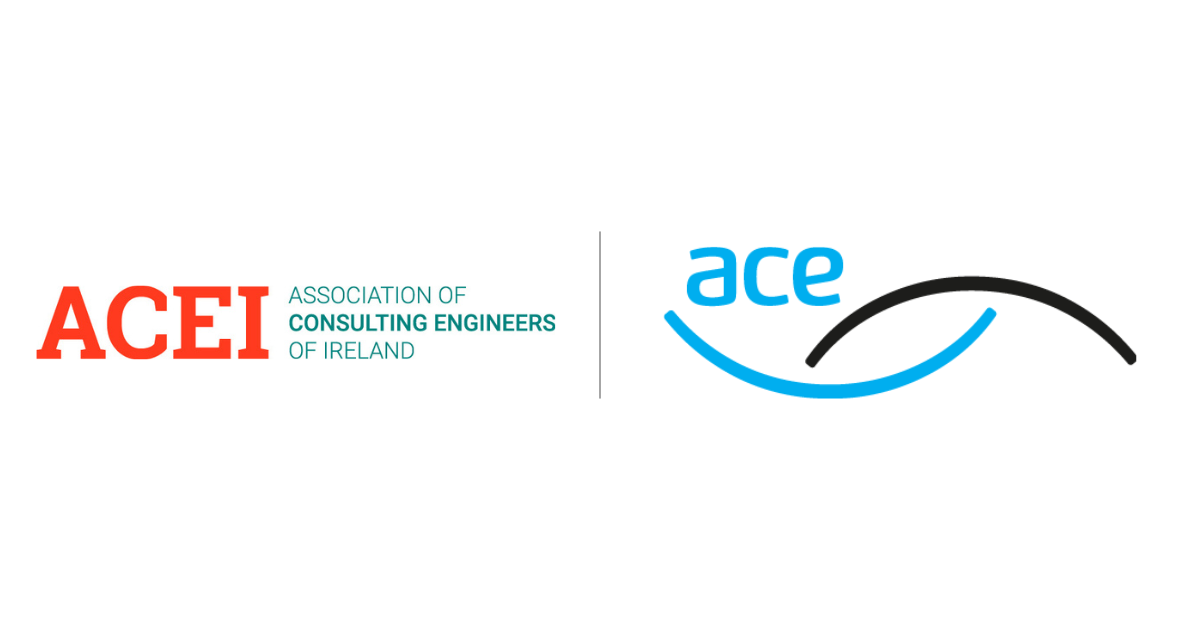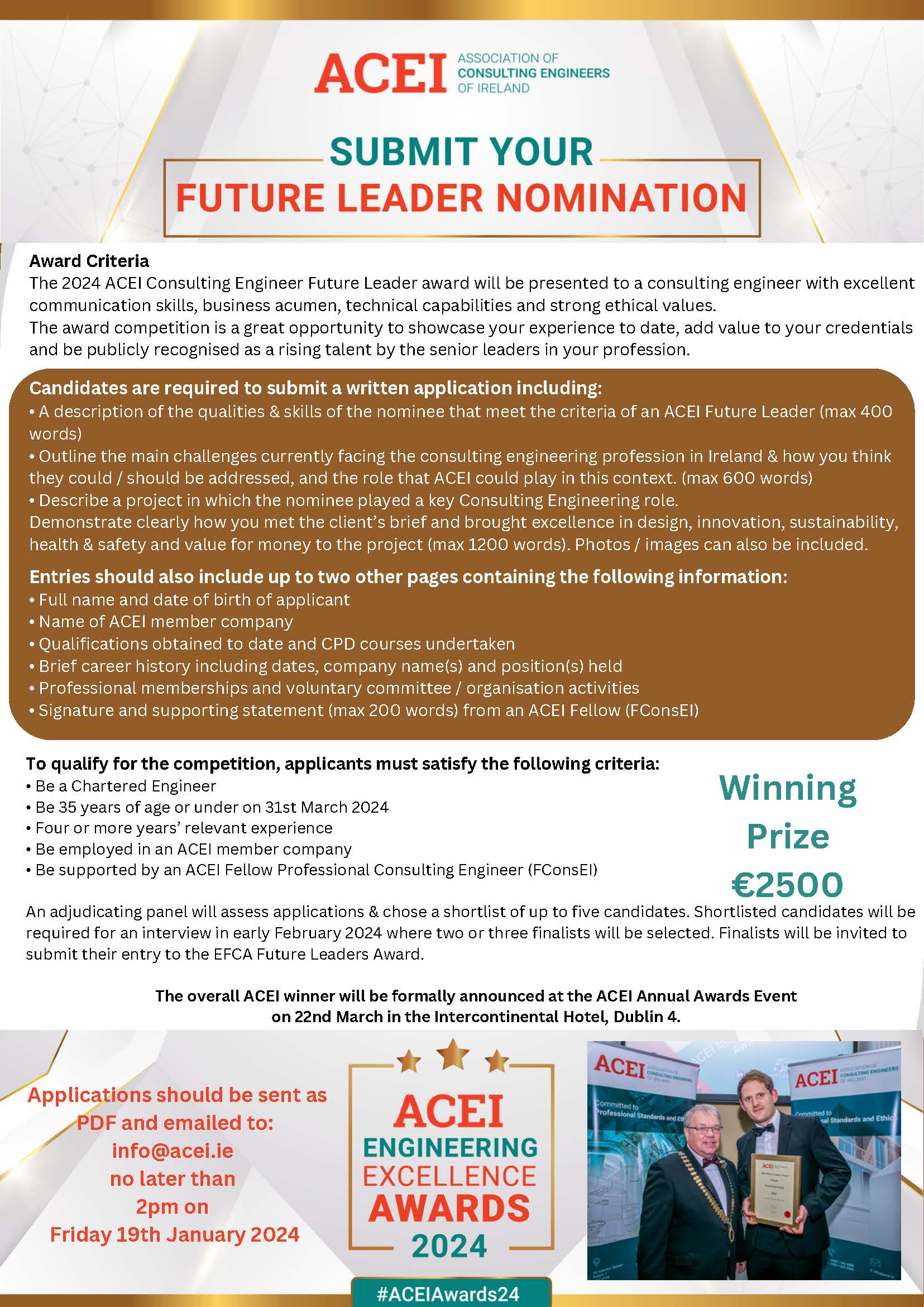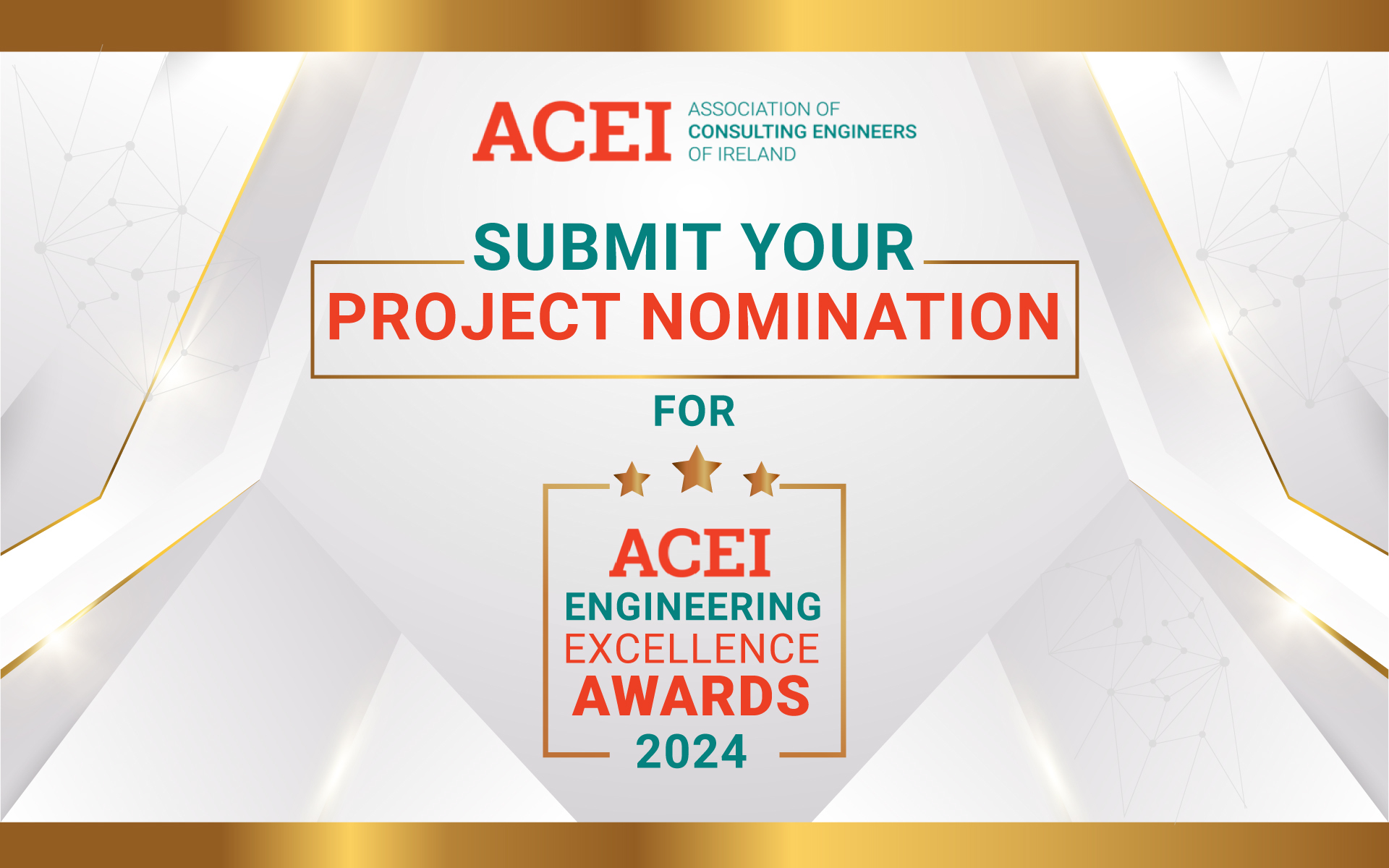The European Federation of Engineering Consultancy Associations (EFCA) has released its position paper on a Whole Life Carbon Roadmap to address the crucial issue of carbon emissions throughout the entire life cycle of buildings and infrastructure projects.
EFCA is a key stakeholder in the shaping and delivery of the roadmap, representing the engineering community, which will design whole life carbon solutions within the broader perspective of the sustainable built environment. The full position paper is available here.

ACE and ACEI to work together to promote built environment sectors across the UK and Ireland.
Joint platform for organisations’ members will encourage shared learning and support best practice.
Two leading associations in the built environment sector are fostering closer links to enable consulting engineers across the UK and Ireland to share their wealth of knowledge and experience.
The Association for Consultancy and Engineering (ACE) and the Association of Consulting Engineers of Ireland (ACEI) have signed a Memorandum of Understanding (MOU), which sets out a clear intent to support the continuous professional development of the engineering professionals of the future and attract more people into the sector, while promoting diversity and inclusion.
The two organisations will work together to foster a strong connection between their members and support shared learning within the worlds of infrastructure across the UK and Ireland.
Stephen Marcos Jones, chief executive of ACE, said he was looking forward to working more closely with ACEI, which would bring mutual benefits to both organisations.
“The two organisations have a wealth of different experiences across the same sector and as the nearest neighbour, it made sense to share industry knowledge and capitalise on the synergies,” he said.
Initiatives like joint events and seminars are likely to come out of the partnership, with a particular focus on emerging professionals and future leaders, culminating in an annual joint event.
“There’s clearly a symmetry between the UK and Ireland when it comes to the opportunities and challenges for our sector and the pitfalls we have overcome,” Jones said. By working together, we have the opportunity to share the many lessons which have been learned along the way and we can enable our respective members to take advantage of the shared knowledge and experience that they have between them. We also have an opportunity to promote the sector to future generations, showcasing the commercial and professional opportunities available.”
Shane Dempsey, Secretary Genaral of ACEI said “There are many cultural and business links between the Irish and British consulting engineering sectors. Both have played integral roles in shaping both societies over the past 100 years. With so many companies with presences across the islands, it makes sense for our two organisations to partner. In the first instance, the partnership will focus on sharing experience, insight and knowledge. In addition, we intend to celebrate the cultural connections between the two sectors over the coming years. Another key focus will be attracting future generations to the industry as a career destination. All the research shows that the industry needs to be repositioned with parents, teachers and of course young people, particularly women. Both the UK and Ireland have hugely ambitious housing, infrastructure and climate change strategies that will provide hundreds of thousands of the next generation with digtalised and globalised careers; if we can get that message across to them collectively, we will have built a sustainable consulting engineering sector in both islands!”
The EFCA newsletter has just been published, it contains information on the following:
- EFCA Autumn 2023 Barometer release
- EFCA Conference 2024 on an EU “Blue Deal”
- Architecture and Engineering: facing accelerated change
- Digital Trends Unwrapped
The full newsletter is available here.
ACEI is pleased to advise that applications are now being accepted for the 2024 ACEI Consulting Engineer Future Leader Award.
The award will be presented to a consulting engineer with excellent communication skills, business acumen, technical capabilities and strong ethical values.
See flyer below for further details.


We are pleased to announce that the application process is now open for the ACEI Engineering Excellence Awards 2024.
The full list of categories is provided below, and all engineering disciplines can apply as appropriate:
6) Micro firm7) Project Management8) Innovation9) Overseas
Closing date for receipt of project nominations: 4pm, Thursday 11 January 2024.The shortlisted projects will be announced during Spring 2024.
The entry forms and procedures can be found below:
ACEI 2024 ENGINEERING EXCELLENCE AWARDS PROJECT NOMINATION FORM
The EFCA 2023 Future Trends Report, “How do I get future-ready?“ has just been published. In a time, characterised by a scarcity of skilled labour and the increasing prevalence of AI solutions, consulting engineering firms are faced with a critical question: How can we guarantee our relevance and transform our business models to ensure enduring success in the ever-changing construction industry?
Drawing on responses and best practice from diverse consulting engineering firms across Europe, our EFCA Future Trends Committee has crafted this comprehensive playbook. This guide is tailored to assist firms in our sector as they navigate the evolving landscape, empowering them to secure their standing as forward-thinking entities ready for the challenges of the future.
The EFCA newsletter has just been published, it contains information on the following:
- EFCA-FEACO meeting with EIB officials
- Call for an EU Blue Deal: making water a policy priority
- EFCA welcomes European Wind Power Action Plan
The full newsletter is available here.
The EFCA newsletter has just been published, it contains information on the following:
- EFCA welcomes ambitious EU 2024 Work Programme
- Decarbonising Transport Infrastructure
- Future Leaders Webinars
- EFCA joining HELLASCO Conference in Athens
The full newsletter is available here.
The Department of Further and Higher Education, Research, Innovation and Science recently published their Careers in Construction Action Plan.
To see a summary of the key takeaways from the report, see here.
To access the full report, visit here : https://www.gov.ie/en/publication/2733a-careers-in-construction-action-plan/#summary-of-research-findings
The Association of Consulting Engineers of Ireland (ACEI) has welcomed the Irish Government’s commitment to capital spending in budget 2024.
Secretary General of the ACEI’s Shane Dempsey stated;
“The government continued the positive trend in support of increased infrastructure investment in this year’s budget. Infrastructure investment is a sustainable investment with huge benefits for the citizen and communities across Ireland for decades to come. The Infrastructure, Climate and Nature Fund has been sought after by many sectors of society and the economy over the past five years. It has the potential to underpin sustained and most importantly sustainable growth in the economy over the next 25 years. In theory, from now on, essential projects that drive regional development, help Ireland achieve climate change goals and enhance communities will be ‘insulated’ from financial downturns and the vagaries of the political system.
At the moment, the Government is turning to the construction industry to building essential infrastructure, solve the housing crisis, hire hundreds of thousands of people whilst investing heavily in digitalisation and ‘green’ construction. This type of investment requires certainty and the strong commitment to the National Development Plan and this budget measure could provide both if correctly implemented.
The ACEI will continue to engage with the Government to accelerate the delivery of critical housing, infrastructure and climate change construction. A critical next step is reform of the Government’s public works contract to optimise outcomes for the exchequer, the citizen and the wider economy. The current contract leads to inefficiencies, costs and overruns in the infrastructure and housing delivery that could be reduced.”
